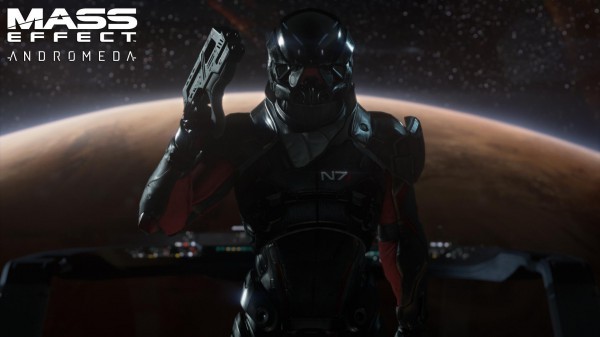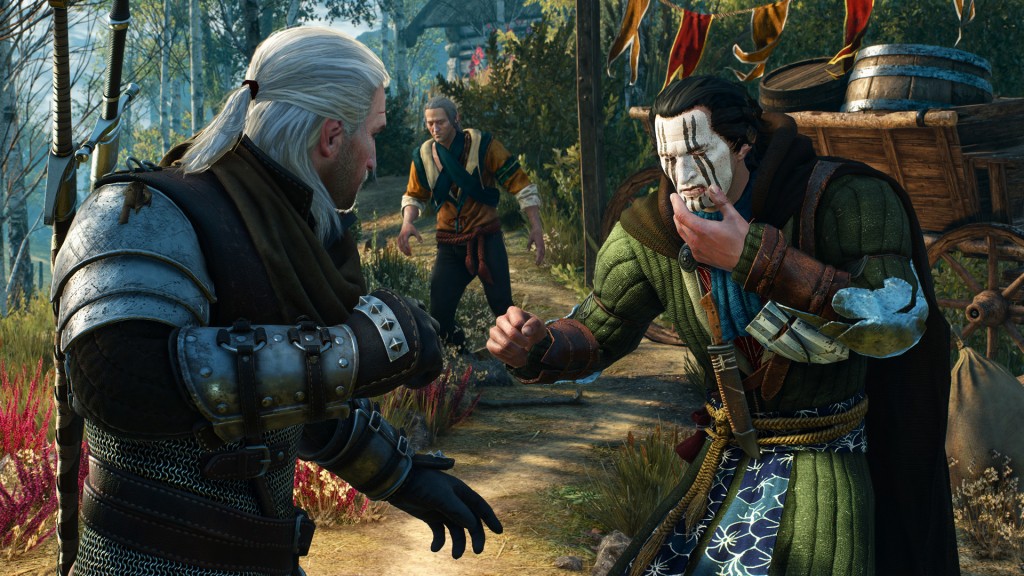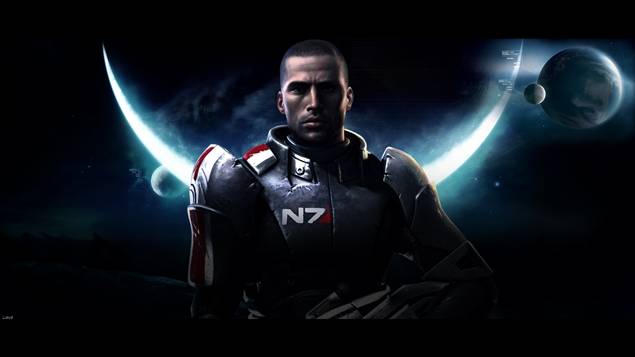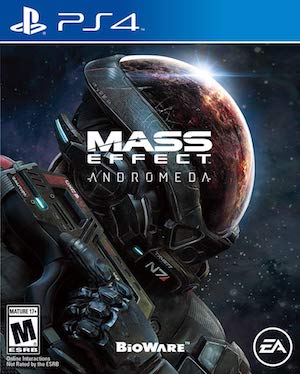
2015 has seen the launch of a great number of excellent titles, including the likes of Metal Gear Solid V, Rise of the Tomb Raider, Batman: Arkham Knight and Halo 5: Guardians. One of the many, many great games to have been released this year, though, stands out as the one game that is unanimously considered to be one of the best not just for this year, or for this generation, but one of the best in recent memory. We are, of course, talking about CD Projekt RED’s ambitious sprawling RPG, The Witcher 3: Wild Hunt. Following in the footsteps of two titles that were increasingly ambitious and showing more and more potential of the development team responsible for them, The Witcher 3 has finally shown everyone just what it is CDPR are capable of.
This article may contain spoilers for Mass Effect 1, 2, 3 and The Witcher 3. You have been warned.
Boasting of an immersive, wonderfully realized game world populated with excellently written characters and a riveting narrative, with so much stuff to do in the large, sprawling world that you can clock up as many as a hundred hours on a regular playthrough, The Witcher 3 has been lauded as one of the best role playing games to have been released in a long, long time.
"BioWare have barely shown us any footage from the game, and we know next to nothing about this sequel, and yet the excitement surrounding its release is palpable. Of course, with a name such as Mass Effect attached to the title, there was bound to be excitement."
Of course, there’s yet another big name RPG franchise making a return soon- next year sees the release of BioWare’s Mass Effect: Andromeda, and after the excellent original trilogy that hardly put a foot wrong, expectations are clearly sky high. BioWarehave barely shown us any footage from the game, and we know next to nothing about this sequel, and yet the excitement surrounding its release is palpable. Of course, with a name such as Mass Effect attached to the title, there was bound to be excitement.
I am a huge fan of the Mass Effect franchise, and I’ve been wondering just what it is BioWare will do this time to knock it out of the park, as they surely did with the first three Mass Effect titles. As I sat down to think about what it was I wanted exactly from Andromeda, I started thinking about other contemporary RPGs and what Mass Effect could learn from them. The first name that came to our minds- (no prizes for guessing) The Witcher 3.
We know what you’re thinking. Mass Effect and The Witcher? The two franchises could not have been more dissimilar. How in the world areBioWare supposed to draw inspiration from The Witcher 3 in any way possible for the better of ME: Andromeda? Wouldn’t it make more sense to compare CDPR’s popular franchise to Dragon Age, which is often considered its direct competitor?
Well, it would, but when we thought about all that The Witcher 3 did, and how well it did it all, and all that (we thought) Mass Effect: Andromeda might attempt to do, we realized that there are certain things that the former did that the latter could take cues from to its own advantage.
"The Witcher 3 manages to do something that most video games have failed to accomplish. It manages to have a vast, open world, all of it ready to be explored by the player from the get go, and in spite of having such an open-ended structure, the game manages to have a tight, focused narrative."
So what exactly is it we think Andromeda should do in a similar fashion to Wild Hunt? The first thing that comes to mind is the structure of the game, which was, arguably, the most remarkable feat accomplished by the latter. The Witcher 3 manages to do something that most video games have failed to accomplish. It manages to have a vast, open world, all of it ready to be explored by the player from the get go, and in spite of having such an open-ended structure, the game manages to have a tight, focused narrative.
We’ve seen over the years that games that choose to focus on having a vast open world often have to sacrifice in one major aspect- the storytelling and the focus on the narrative. We’ve seen it with Fallout, we’ve seen it with The Elder Scrolls, and more recently, we saw it with Metal Gear Solid 5. The Witcher 3, however, was a perfect balancing act. It let you explore its vast, beautiful world in vein of the aforementioned titles, and yet it was still undoubtedly a tightly told story with a great focus on narrative.
And from what we’ve seen of Andromeda so far- what little we’ve seen of it- it looks like BioWareare going to make it an open world title. With the return of the Mako, which we last saw in the original Mass Effect, and with an entire new galaxy for us to explore, it certainly looks like BioWareare looking for Andromeda to have a structure that is similar to what we saw in last year’s Dragon Age: Inquisition. Rather than having one large open world a laSkyrim and Witcher 3, it looks like Andromeda might be going for several semi-large areas (or planets) open to exploration, like what we saw in Inquisition.
However, given that Mass Effect has always been a story-heavy franchise, we’ve been wondering how exactly the developers will balance the narrative and the theme of galactic exploration. Make no mistake, combining Mass Effect’s tight combat with what we’re hoping will be much improved Mako sections, the exploration could actually be done really well. However, BioWare need to look at how the same was handled in The Witcher 3 and take cues, because the narrative is the one aspect they should not compromise in as far as Mass Effect is concerned.
How exactly did The Witcher 3 manage to balance exploration and narrative so perfectly? It’s simple- every character, every quest, every side quest had its own, unique, individual story, however short it was, and all of it was excellently crafted. No matter how large the side quests in The Witcher 3 were- be it the secondary quests, which tied in with the story while being a separate entity altogether at the same time, or the regular Witcher contracts, which were more in the vein of your regular RPG side quests, everything you did in The Witcher 3 had its own story, written excellently, and acted even better.
"Make no mistake, combining Mass Effect’s tight combat with what we’re hoping will be much improved Mako sections, the exploration could actually be done really well. However, BioWare need to look at how the same was handled in The Witcher 3 and take cues, because the narrative is the one aspect they should not compromise in as far as Mass Effect is concerned."
Compare that to what we saw in the likes of Skyrim and Inquisition. In Skyrim, the main quest itself was merely a fraction of the experience. If you’ve played Skyrim and only played the main quests- well, you haven’t played Skyrim then. As far as Inquisition is concerned, the game world was brimming with things to do with more side quests than you knew what to do with, but most of these quests were similar to the kind we see in MMOs, entailing tasks such as “go there and fetch five of these herbs” or “go there and kill three of these beasts”. They were, to put it plainly, very unimaginative and contributed nothing to the main overarching narrative at all.
BioWare need to make sure they do not fall into the same trap once again, as they did with the third Dragon Age title. They only need to look at Mass Effect 3- the game wasn’t open world by any means, and it didn’t have as many side quests as there were in the majority of the games we’ve been talking about thus far, but most- if not all- of the side quests in ME3 ultimately contributed to the main overarching story- the Reaper threat and how it was effecting the populace of the galaxy. It worked excellently well and played a huge part in building the atmosphere and tension that Mass Effect 3 built so well, and BioWare only need to do something similar, albeit on a much bigger scale this time.
The one thing Mass Effect 3 did not do too well, however, was giving weight to player choice. We don’t mean we as the players did not get to make too many decisions- we did. Mass Effect 3 was littered with tough decisions to make, forcing you to sacrifice characters you had come to adore over the course of the trilogy for the greater good of the galaxy in the war against the Reapers, and making you resolve massive conflicts that had been brewing over the course of the trilogy, but so much of what you did failed to have any meaningful impact on the story. So many of the massive decisions in the game- whether or not you choose to save the Rachni queen, whether or not you choose to cure the genophage, which race you side with in the war between the quarians and the geth- failed to have any meaningful impact on the ultimate outcome of the game. And that was disappointing to see, not only because these were huge decisions that we made as players, but also because BioWare had crafted choice and consequence scenarios so perfectly in Mass Effect 2, illustrated perfectly by the entire two hour long Suicide Mission climax.
"Mass Effect 3 was littered with tough decisions to make, forcing you to sacrifice characters you had come to adore over the course of the trilogy for the greater good of the galaxy in the war against the Reapers, and making you resolve massive conflicts that had been brewing over the course of the trilogy, but so much of what you did failed to have any meaningful impact on the story."
Once again, BioWare only need to look at their past accomplishments in Mass Effect 2 and repeat the same feat, but looking at games made by direct competitors, The Witcher 3 proves to be a clear benchmark in this regard- a game that had over thirty different variations of three largely different endings. Every tough choice you made in The Witcher 3 played a part in how Geralt’s story unfolded, and you realize just how perfectly choice and consequence have been woven into the experience when you sit down to compare your playthrough with a friends’- or one of your own consequent playthroughs- and realize how vastly different the two are. Not only does this make for a riveting experience when you play the game, it also makes the game that much more relayable. And when a game promotes as many replays as the likes of The Witcher 3 and Mass Effect 2 did, you don’t even need a multiplayer mode.
And that is one more thing BioWare need to look at, not just in The Witcher 3, but in every other successful RPG on the market and in their own past experiences. Mass Effect: Andromeda will be a much better game if all they focus on is the single player mode. The likes of Mass Effect 2, Skyrim, and more recently, Fallout 4 and The Witcher 3 are in no way lesser games for not having multiplayer modes- they are, in fact, some of the best games to have been released in recent memory. And while the multiplayer mode in Mass Effect 3 was fairly enjoyable- the one in Inquisition too, though to a much lesser extent- it ultimately hindered with the single player experience, and the two games would have been much better off if BioWare had only spent the time and resources they spent on the MP on polishing and improving the single player mode instead. This isn’t to say the single player in Mass Effect 3 (or Inquisition) is bad- not by any means- but that doesn’t mean they couldn’t have been significantly better.
One thing is for sure though- no matter what route BioWare take with the structure of the game, Mass Effect: Andromeda is sure to divide opinion- most games of this kind of a commercial scale are. However, if BioWare can go back to what they did so well in Mass Effect 2 and 3, while taking cues from the likes of The Witcher 3, there’s no doubting that Andromeda will be one hell of a game. All that remains to be seen now is if BioWare are listening. We sure hope they are.
The views expressed in this article are those of the author and do not necessarily represent the views of, and should not be attributed to, GamingBolt as an organization.


















